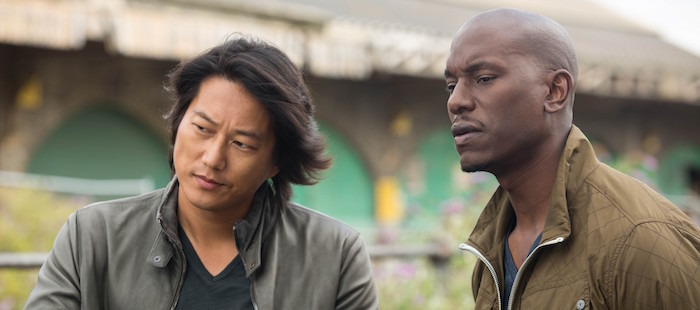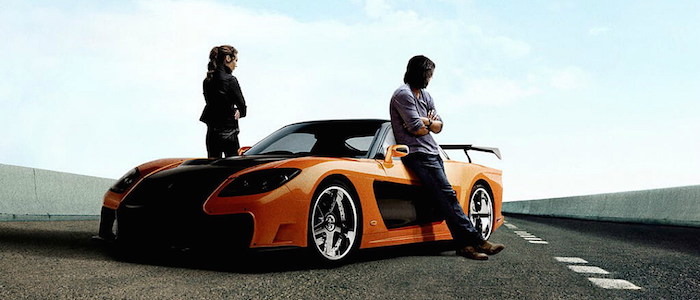One Year Later, 'Fast And Furious' Still Hasn't Dealt With #JusticeForHan
(Welcome to The Soapbox, the space where we get loud, feisty, political, and opinionated about anything and everything. In this edition: it's been one year since the release of The Fate of the Furious and the lack of #JusticeForHan still stings.)
The Fast & Furious franchise is headed for its ninth entry with Hobbs & Shaw, the Dwayne Johnson/Jason Statham-led spinoff from director David Leitch. It marks a departure from the series' new status quo after a decade (and then some) of Vin Diesel-driven family drama. Though more pertinently, it presents the franchise with another opportunity for something with which it's all too familiar: course correction. Specifically, it's an opportunity to deliver #JusticeForHan.
The departure of Sung Kang's Han Lue (a.k.a. Han Seoul-Oh) was inevitable come Furious 7. After the character's demise in entry #3, The Fast and the Furious: Tokyo Drift back in in 2006, the series went into prequel mode for three full films all the way through Fast & Furious 6, just so Han could rejoin the fold. In the seventh film in 2015, time finally catches up with the Fast Family as Jason Statham's Deckard Shaw is retroactively revealed to have caused the crash that killed Han in Japan. It's a major plot point that makes Shaw the target of Casa de Toretto.
But with the eighth entry, The Fate of the Furious, in April 2017, Deckard himself became part of the Family, with Han being entirely forgotten. Something was amiss in the fabric of this saga, and it wasn't sitting well with fans who had embraced the series unironically, this writer included.
The Road to This Point
The Fast & Furious saga is hard to make sense of if you're an outsider, but our Fast Fandom is a welcoming one. It's fun to explain the strange chronology and even stranger titles to those who haven't yet had the pleasure, but the gradual evolution of the series from macho street-racing to sincere action saga driven by togetherness is precisely why Han mattered. It's also why ignoring his death in F8 feels like such betrayal of narrative and theme.
But first, a primer:
To understand why any of this matters in the first place, or why people have been tweeting about #JusticeForHan with the same mix of irony and sincerity as the series itself (or in many cases, wholly sincerely) requires going back to the series' origins. No, not The Fast and The Furious, which introduced the characters to the big screen. I mean the film in which the series was truly born, narratively and thematically: The Fast and the Furious: Tokyo Drift.
Seoul-Oh: An Origin Story
Tokyo Drift is one of the best Hollywood films about outsider experience. Justin Lin brings to it a unique sensibility as a Taiwanese immigrant to America, telling a tale of assimilation and finding oneself in a foreign culture alongside a band of fellow outsiders. In the film, set almost entirely in Tokyo, Caucasian American expat kid Sean Boswell (Lucas Black) finds a sense of purpose when he joins up with African American army brat Twinkie (Shad Moss/Bow Wow), mixed-race "gaijin" local Neela (Nathalie Kelley) and Korean American Han (Sung Kang), a found family who each search for solace behind the wheel.
Han was introduced at a time when Hollywood saw few leading characters of East Asian ethnicity, let alone ones who were allowed to be cool. He was laid back, his mysterious criminal past made him compelling, and his post-smoking oral fixation (he's constantly snacking) made him feel like he had a full interior life and a past behind the screen. He was detached without being removed, mentoring Lucas Black's Sean in his world of drift-racing, and he connected with enough fans – Asian Americans especially – that he was resurrected for three more features and the Fast & Furious short film Los Bandoleros. But Tokyo Drift may not have been Han's first on-screen appearance.
In 2002, Justin Lin directed the Asian American cult hit Better Luck Tomorrow, focusing on a group of Asian American overachievers whose boredom with academia leads them into a world of crime and excess – not unlike Lin's Fast protagonists Sean Boswell, who drifts through life until he finds his underground calling. The film also featured Sung Kang as a character named Han (albeit with the full name Han Hu), a similarly detached "cool guy" criminal. Of course, the intent was likely to have Han from Tokyo Drift be something of a thematic successor to Han from Better Luck Tomorrow, but even in literal terms, the pieces fit. It isn't too much of a stretch to consider them one and the same person; Han Hu was a smoker while Han Lu appears to have quit smoking, and the name change isn't a stretch either since the name he uses in films #6 & 7 (Han Seoul-Oh, pronounced "Han Solo") is said by Lin to have been a fake ID.
Either way, whether literally or in spirit, Sung Kang's laid back, cool-as-a-cucumber Han has been around in the Asian American consciousness in some form since at least 2002, spanning eleven years and five feature films; thirteen years and six films if you count his flashback and funeral in Furious 7. And, given the ongoing conversation about orientalism and whitewashing in American cinema and the casual dismissal of Asian narratives, the mainstream failure to take the conversation about Han seriously feels especially egregious.
The Failure of F8
The Fate of the Furious (2017) was the first in the series not helmed by an Asian director since 2003. And while Straight Outta Compton director F. Gary Gray's bonafides at the intersection of cinema and anti-blackness are unquestionable, the series' notable narrative shift is owed more to thematic dissonance than overt intent with regards to Han. The result however is unfortunately Fast's key Asian player being swept under the rug regardless, in a manner that runs counter to what these films are about.
Vin Diesel mumbling "Family" (or "Fambly") has become something of an in-joke even amongst fans, but it's been the series' mantra for almost a decade. Super-producer Diesel's bold-faced sincerity in this muscle-car universe has been driving the narrative ever since Fast Five, which combined all the series' disparate elements a full year before The Avengers. Fast & Furious 6 saw the likes of Diesel and Giselle risk life and limb for the ones they loved; the latter even lost her life protecting Han. Furious 7 continued that thread, approaching it from multiple angles with the heroes fighting to avenge and preserve their Family, while Deckard Shaw fought to avenge his own brother. It was Family vs Family in a film that ended with a meta-textual goodbye to Paul Walker's Brian O'Connor, as the words "For Paul" were scrolled across the screen. Family was, by this point, built into the series' DNA, and none of its car-jump, tank-flip nonsense would've been nearly as fun without members of the Fast Fam either driving the vehicles (Dom, Brian) or freaking out about the crazy predicaments (Roman, Tej).
Now, Fast & Furious is clearly a series un-beholden to any one tone or idea. A total departure from its preceding decade, while unpalatable to some, could have worked in its own way. Thor: Ragnarok, for instance abandons the character of Thor seen in four prior films and delivers an all-out farce. But to say that The Fate of the Furious abandoned its focus on family and is therefore not beholden to Han being a part of it would be disingenuous. The film is perhaps about family in ways that even its predecessors weren't, putting Dom's found Family (with a capital 'F') to the test by making him turn against them in order to protect his biological family, a son he didn't know he had.
The entire narrative is constructed around the idea of Family itself – again, on both sides, as Dom approaches the Shaw bros' mother (Helen Mirren) for help. And while this results in an admittedly hilarious airplane rescue involving Jason Statham and a baby, not a single member of Dom's Family brings up the fact Deckard was responsible for killing Han when Deckard is first brought on board. It's a fact never once contended with, and the film even ends with Deckard being invited to the Toretto family cookout, a sacred space crafted over the last four films where the Family shares love and Coronas.
In a film about Family, where Dom has to choose between found Family and biological family, he chooses biological family regardless of what the narrative suggests. The balance is all lip-service, and the film's theme is left unreconciled. Deckard is welcomed into the Toretto home after rescuing Dom's biological son. Elena (Elsa Pataky), the child's mother, is also given an unceremonious exit after being shot in the head to motivate Dom, but this is at the very least contextualized as unequivocally terrible.
Han's death on the other hand, at the hands of a man the Family spent the last full movie hunting down, provides the characters with not even a hint of doubt or dissonance when it comes to welcoming Shaw. Their initial dislike for him is vague, which allows their eventual acceptance to be unanimous and without question. Which is not to suggest that Shaw or any character in this series ought to be beyond redemption, but it's a redemption he doesn't work for, and a death neither he nor the heroes acknowledge.
It's as if Han never existed at all, and it breaks the very fabric of this universe. A series that's built up goodwill with global audiences by bringing together a multi-ethnic, multi-national family of vagrants, whose sincere love for one another is rivaled only by the series' sincere love of cars, now found itself abandon the very story it had been telling for over a decade.
Which is precisely why, now that Statham's character Deckard Shaw is getting his own spinoff, the series needs to address #JusticeForHan. Though luckily, if Hobbs & Shaw fails to do so – it might, as none of the original Family are likely to feature in this film – there are rumours of Justin Lin returning to direct Fast & Furious 9, and potentially Fast & Furious 10. Bringing Han back in some form isn't out of the realm of possibility, but even if Hollywood's favourite Korean American stays dead, it's hard to imagine Lin won't want to right the wrongs done to a character who's been part of his oeuvre for almost two decades. It won't undo the wrongheaded narrative decisions in The Fate of the Furious, but it'll certainly go a long way to bringing the series back to its former glory by making its talk of Family feel meaningful once more.
In the words of Han himself, "Fifty percent of something is better than a hundred percent of nothing."



